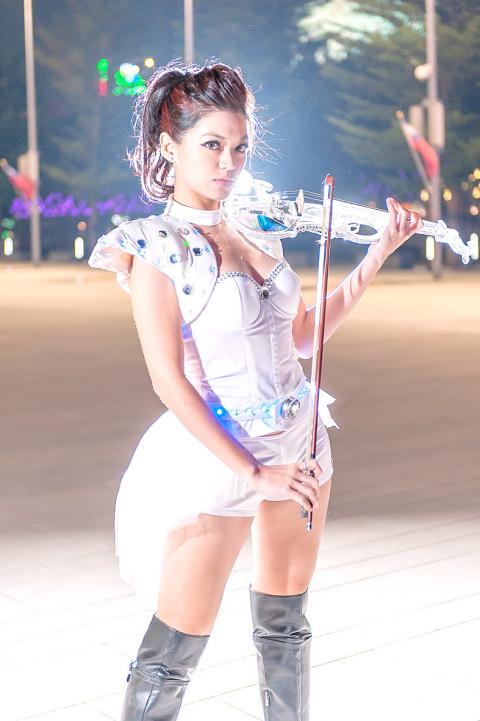For Connie Hsu (徐冠宜), all the world’s a stage. On recent back-to-back Friday and Saturday nights in Chiayi City, Hsu performed two short sets outdoors for the opening of a new chain store. She had the 200 spectators in awe both nights as she displayed an in-your-face set with an electric violin.
Hsu, 29, trained in music in the US and now works as a performing violinist in Taipei as part of the popular all-women violin group V-Band.
In Chiayi, she hit all the right notes as she turned some Beethoven classics into semi-rock power songs in the tradition of British violinist Vanessa Mae, one of her idols. Dressed to kill in a sexy black dress — a long one for one set, and a short one for the second set — Hsu rocked back and forth on her black high heels, wowing the enthusiastic crowd with her performance.

Photo courtesy of Connie Hsu
There was no stage, just a sidewalk platform a few centimeters high, and Hsu often stepped out into the audience and gave an up close and personal show to shoppers just a few meters away.
Hsu has played with V-Band all over Taiwan as well as Hong Kong and Singapore, and she is often on the road with her bandmates.
Now Hsu hopes to turn her stage personality and dramatic flair for performing live into a solo act.
Hsu has been performing in Taiwan for four years now, having graduated from the Cincinnati Conservatory of Music in 2010.
“Being a soloist has always been one of my dreams. While I am not a perfect technical player, I love performing in public as a solo artist,” she said, adding that she involves the audience by making eye contact.
“My goal is to get the audience to come closer to me, face to face. I don’t want to just perform in the traditional way on a faraway stage where there is a big distance between the musician and the listeners,” she said
Hsu says she’s a big fan of Vanessa Mae, the British rock violinist and confesses that her full English is “Connie Mae Hsu.”
“It might sound dreamy, but I dream of becoming Taiwan’s Vanessa Mae,” Hsu said.
“V-Band supports me, and we all support each other, it’s great to be part of something like this. But to have my own solo career like Vanessa Mae, that will be my dream come true.”
As the leader of V-Band, Hsu still does the solos on stage, and she has also been busy playing with other chamber groups in Taipei, she said.
When asked if other members of the band were apprehensive or jealous of her solo dreams, she said that they were all very supportive.
“We are like sisters and friends, the four of us. Since I do the solos in the band, the other members are not jealous at all to see my pursuit of a solo [career]. They wish me well, in fact.”

One of the biggest sore spots in Taiwan’s historical friendship with the US came in 1979 when US president Jimmy Carter broke off formal diplomatic relations with Taiwan’s Republic of China (ROC) government so that the US could establish relations with the People’s Republic of China (PRC). Taiwan’s derecognition came purely at China’s insistence, and the US took the deal. Retired American diplomat John Tkacik, who for almost decade surrounding that schism, from 1974 to 1982, worked in embassies in Taipei and Beijing and at the Taiwan Desk in Washington DC, recently argued in the Taipei Times that “President Carter’s derecognition

This year will go down in the history books. Taiwan faces enormous turmoil and uncertainty in the coming months. Which political parties are in a good position to handle big changes? All of the main parties are beset with challenges. Taking stock, this column examined the Taiwan People’s Party (TPP) (“Huang Kuo-chang’s choking the life out of the TPP,” May 28, page 12), the Democratic Progressive Party (DPP) (“Challenges amid choppy waters for the DPP,” June 14, page 12) and the Chinese Nationalist Party (KMT) (“KMT struggles to seize opportunities as ‘interesting times’ loom,” June 20, page 11). Times like these can

JUNE 30 to JULY 6 After being routed by the Japanese in the bloody battle of Baguashan (八卦山), Hsu Hsiang (徐驤) and a handful of surviving Hakka fighters sped toward Tainan. There, he would meet with Liu Yung-fu (劉永福), leader of the Black Flag Army who had assumed control of the resisting Republic of Formosa after its president and vice-president fled to China. Hsu, who had been fighting non-stop for over two months from Taoyuan to Changhua, was reportedly injured and exhausted. As the story goes, Liu advised that Hsu take shelter in China to recover and regroup, but Hsu steadfastly

You can tell a lot about a generation from the contents of their cool box: nowadays the barbecue ice bucket is likely to be filled with hard seltzers, non-alcoholic beers and fluorescent BuzzBallz — a particular favorite among Gen Z. Two decades ago, it was WKD, Bacardi Breezers and the odd Smirnoff Ice bobbing in a puddle of melted ice. And while nostalgia may have brought back some alcopops, the new wave of ready-to-drink (RTD) options look and taste noticeably different. It is not just the drinks that have changed, but drinking habits too, driven in part by more health-conscious consumers and